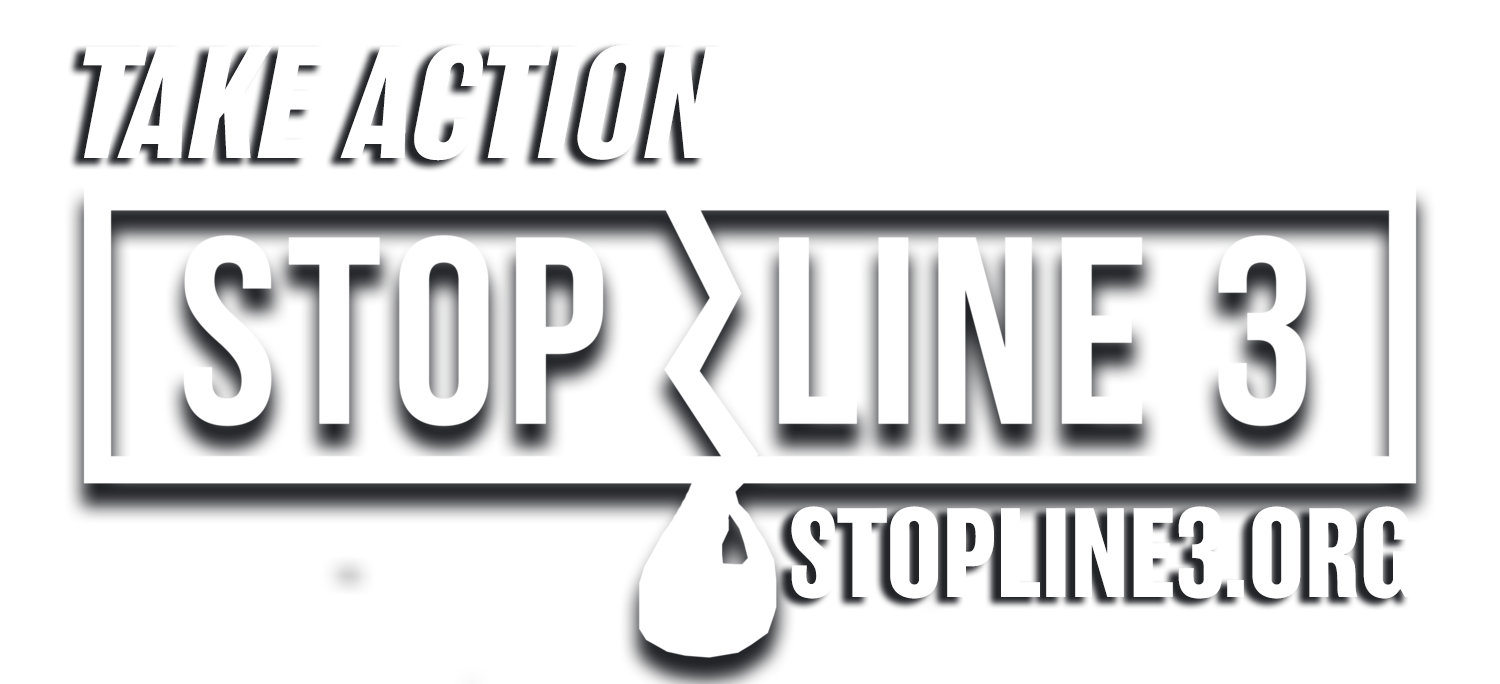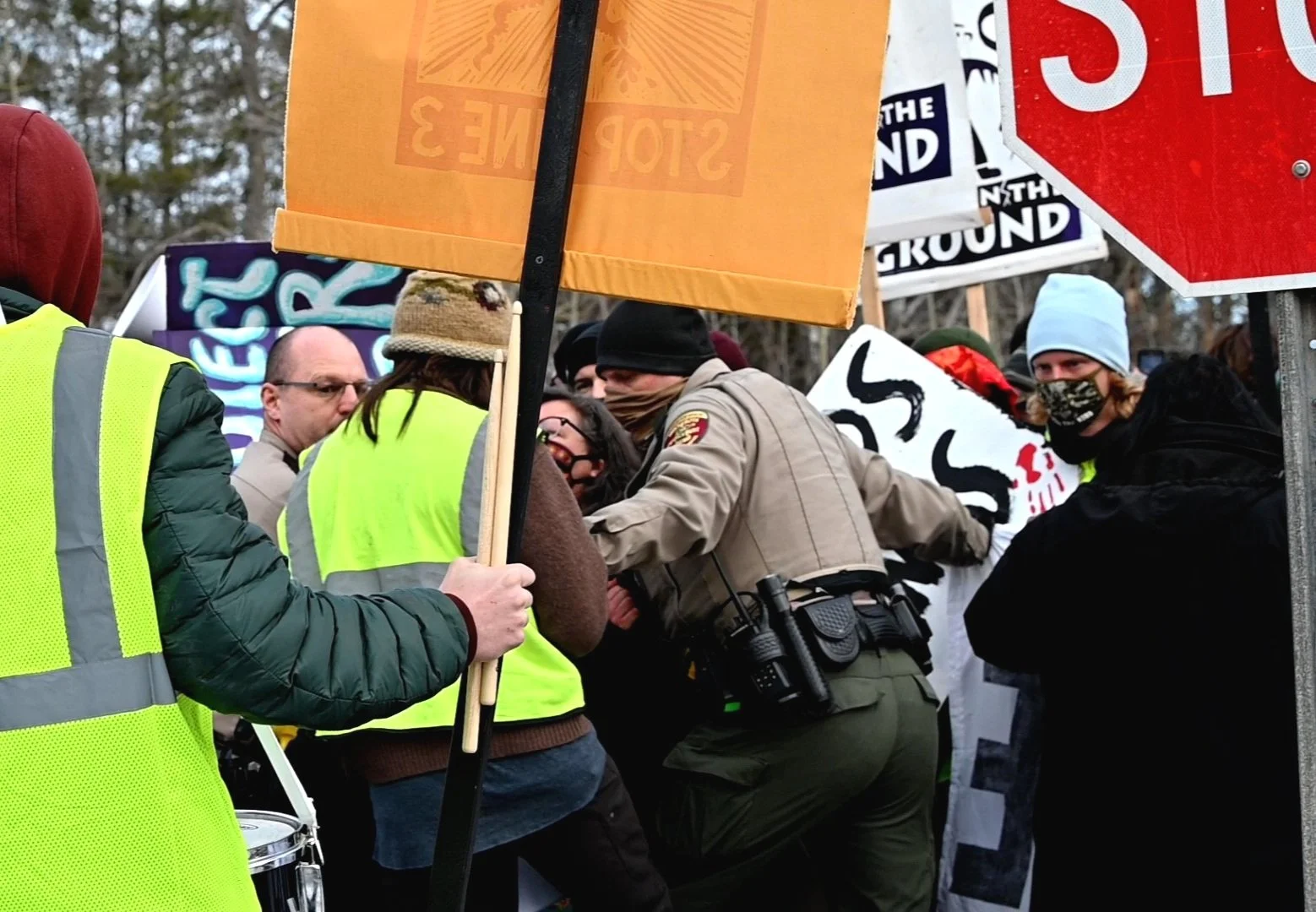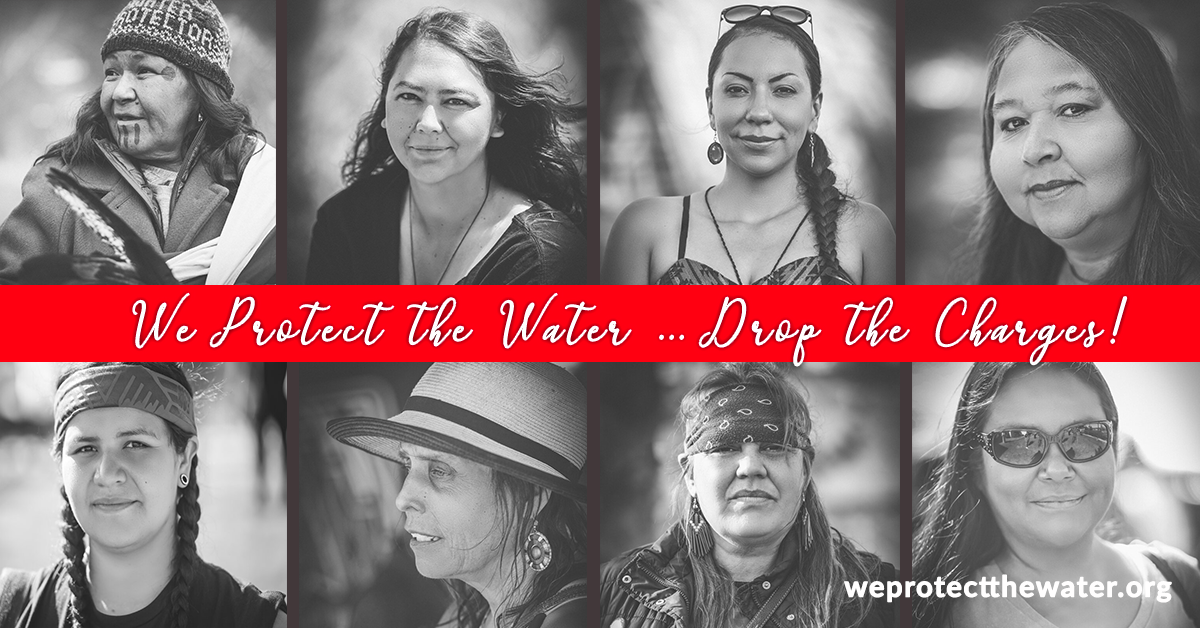Shanai Matteson grew up in Palisade, Minnesota, a small town of several hundred people set on the banks of the Mississippi River as it winds from its headwaters in northern Minnesota toward the border with Wisconsin and south all the way to the Gulf of Mexico. As a child, Matteson swam in the Mississippi.
When the coronavirus pandemic began, she decided to return to Palisade from Minneapolis—in part so her family could help her with childcare and rent, but also because the Canadian multinational corporation Enbridge was building a tar-sands pipeline through her hometown. She wanted to fight it.
“[The police] saw it as a way to get new gear. They all bought new boots, and they got new guns, and they get to keep all that stuff now—and they were able to evolve a way of policing protest movements.”
One-and-a-half years later, on July 6, 2021, with the appeals process exhausted and pipeline construction underway, Matteson and a group of water protectors, including Native American writer and activist Winona LaDuke, arrived at the site where Enbridge was drilling a tunnel for the pipeline beneath the nearby Willow River. What they saw was disturbing.
“We had gone into the river channel basically to witness, and we ended up discovering a frac-out where they had spilled drilling mud into the river channel and hadn’t reported it yet to the pollution control agency,” Matteson recalls.
The Minnesota Department of Natural Resources has a presence in the vicinity, but was of little help. “They sent more police to arrest the protesters than they did monitors,” Matteson says. “There were no monitors.”
In October, Enbridge completed construction on the new Line 3 pipeline, which crosses the Willow River next to the land where Matteson’s grandmother was born. Tar-sands oil from Canada has been flowing through the 1,097-mile pipeline ever since.
But for the activists who fought the pipeline’s construction in Minnesota for nearly a decade—a collection of local Indigenous activists and non-Native allies—the fallout from their battle is still ongoing.
Scores of activists face ongoing legal cases, and many more are processing what they learned about the nature of state power and capital, the intricacies of movement building, and the lessons they’ll take into the climate fights to come.
For Joshua Preston, a movement attorney and member of the Minnesota National Guard, the experience of representing Line 3 protesters has been a crash course in understanding real world power dynamics.
“It’s one thing to engage with these ideas in the abstract,” Preston says. “It’s very different when you see it for yourself—when you actually begin litigating these cases and you see how much power differential there really is and how little accountability there is on the part of law enforcement.”
Preston says the Stop Line 3 legal movement has documented some 950 incidents in which the state arrested or cited a protester; he said there has only been one instance, in Itasca County, where a county attorney voluntarily dropped a charge related to Line 3 opposition.
Maybe we didn’t win this one, but we’re going to be better situated to win the next one.”
In a number of cases, those charges appear excessive. As The Guardian reported earlier this month, one protester who chained herself peacefully to a vehicle in the middle of a road last June was charged with felony theft—a charge that carries up to five years in prison.
Trials are ongoing. Michelle Naar-Obed, a member of the Catholic Workers who was arrested on the Prairie River in March of last year, appeared in court on February 25. Matteson has a court date set for April 11.
Many protesters have faced recurring court dates and decisions over whether to plead guilty to crimes in exchange for reduced penalties, or to go to trial and risk the possibility of hefty fines and incarceration. They see the prosecutions as emblematic of how the state’s criminal justice system has served Enbridge’s interests during the Line 3 fight.
In 2020, for instance, Enbridge set up an escrow account to be distributed to law enforcement to cover costs associated with policing the pipeline route ranging from overtime pay to riot gear. The corporation quickly poured millions into the account.
“[The police] saw it as a way to get new gear,” Matteson says. “They all bought new boots, and they got new guns, and they get to keep all that stuff now—and they were able to evolve a way of policing protest movements.”
For Matteson, who intends to stay in Aitkin County long-term, the experience on the Willow River that July day was instructive: People cannot rely on the state, let alone Enbridge, to ensure the relative health of the land and water.
Matteson is now part of a group that does regular water testing at sites across northern Minnesota as activists attempt to keep track of how the pipeline is affecting their rivers and streams.
Kerem Yucel via Creative Commons
Winona LaDuke (left) talks to the Hubbard County Sheriff near the stock pile of the Enbridge Line 3 pipeline in Park Rapids, Minnesota.
LaDuke, meanwhile, has turned her attention in part to several other fights threatening waterways and ecosystems near the White Earth Reservation and throughout the Upper Midwest.
In January, Tesla announced that it had reached an agreement with Talon Metals to purchase 165 million pounds of nickel over the next six years in a $1.5 billion deal. Talon Metals, a partner of the multinational mining corporation Rio Tinto, wants to develop a mine in Aitkin County just miles from the site of the Willow River frac-out.
In early February, the U.S. Department of Energy awarded Talon a multi-million dollar research and development grant to explore carbon storage potential at the Tamarackwww.talonminerisks.com/ site. LaDuke calls the entire plan “the most absurd idea we’ve ever heard.”
“That’s our heartland over there,” LaDuke tells The Progressive. “They’re very shallow lakes that are full of wild rice, and the dewatering that they propose for that mine in fact would affect the viability. They are going to draw down those lakes. So we’re going to fight them.”











